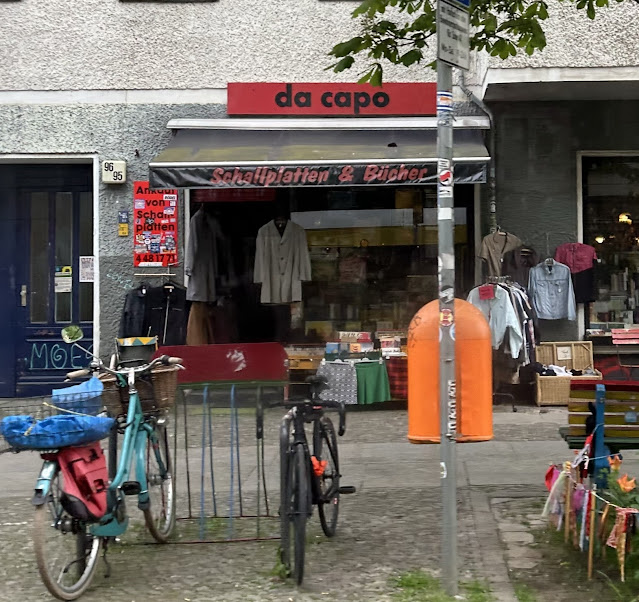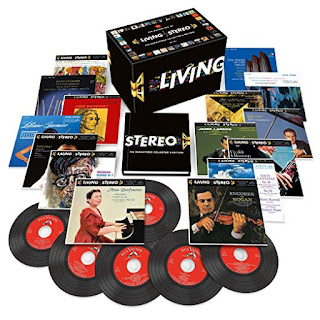Record hunting in Berlin, Part One: Discovering Eterna
Da Capo Schallplatten & Bücher is a little gem of a record and book shop nestled in the Berlin district of Prenzlauer Berg. Up front you'll find bins of jazz, soul, psych, and world music. Head to the back and you'll be treated to their relatively large classical section, surrounded by books and other small antiquities. The stacks begin to your left with labels for early music, followed by composers in alphabetical order. There are also discrete sections for contemporary composers, Russian composers, violinists, pianists, and Eterna Edition releases.
I spent at least a good hour or more flipping through these stacks of very reasonably priced records (most of the ones I picked up were between 3 and 5 euros). Most of the records were German pressings, but there were a small number of UK, French, Czech, and US releases as well.
One special feature at Da Capo is an extensive selection of classical records produced by the East German (Deutsche Demokratische Republik [DDR]) label Eterna. My experience with this label on vinyl is very limited since we rarely see such records in the U.S., so I thought this would be a good opportunity to try to educate myself.
Unfortunately, there is not a lot of information available on the internet. From what I could gather in English and German, Eterna's parent company, Lied der Zeit Schallplatten-Gesellschaft mbH, was founded in 1947 by the German singer and actor, Ernst Busch. In 1953, the private company had to change to a state-owned VEB (Volkseigener Betrieb, translation "People-owned enterprise"), and in 1955, VEB Lied der Zeit was renamed VEB Deutsche Schallplatten Berlin. Eterna was designated as the label for classical music, opera, and operetta, while its sister label Amiga became the label for pop, rock, and jazz releases.
Eterna was essentially the principal classical label in the DDR. The label's discography is quite extensive and includes a wealth of recordings made by the major East German orchestras, such as the:
- Gewandhausorchester Leipzig
- Berliner Rundfunk-Sinfonie Orchester
- Staatskapelle Berlin
- Staatskapelle Dresden
In 1977, Eterna released the Eterna Edition of the complete works of Beethoven on 116 discs. I saw several of these in the Eterna Edition section at Da Capo.
Eterna had an agreement with other labels (such as Deutsche Grammophon, Telefunken, Ariola-Eurodisc, Philips, and EMI) to release its recordings in the west. Conversely, selected recordings from the west were also released by Eterna in the DDR.
The price of the records was decided by the state; for Eterna, single albums were priced at 12,10 marks. If my calculations are correct, this would have been around $3.32 per record in 1971.
Here are a few of the ones I decided to pick up at Da Capo:
I have loved the Bach violin concertos ever since my youth when I first came across the EMI recording with Pinchas Zukerman, Itzhak Perlman, and Daniel Barenboim. There is no shortage of recordings of these works, and if you are also a fan of them, you probably have your favorite versions. For 3 euros, I was happy to pick up this Eterna recording of Igor Oistrach with the Gewandhausorchester Leipzig and the Staatskapelle Berlin, both conducted by Franz Konwitschny. According to the liner notes and Discogs, this particular album was first released by Eterna in 1971. I did a little more investigating, and it looks like Oistrach originally recorded the Bach E major concerto (side 1 of this record) along with the two Beethoven Romances for violin with Konwitschy and the Gewandhausorchester Leipzig, and this was released as a mono recording by Eterna in 1956. The D minor concerto (side 2) with the Staatskapelle Berlin was released as a 10" mono recording by Eterna in 1959. Eterna must have decided to package the two together for this 1971 reissue, and although the cover and label say stereo, it sure sounds to me as though it is in mono. Both concertos are given strong and robust performances.
You can find more from Igor Oistrach on this blog here.
This disc was originally a UK EMI/Columbia Studio 2 Stereo release from 1972 ("A Russian Festival Gala") that saw pretty wide release in France, Germany, Italy, Australia, Japan, the Netherlands, Canada, and the United States. Melodia-Eterna issued this in the DDR in 1975. It's a solid recording of classic Russian orchestral repertoire given spirited performances by Rozhdestvensky and the Orchestre de Paris. I haven't heard the original UK release, but I would say that this Eterna release probably comes pretty close in terms of sound. It's got the excellent clarity, transparency, wide dynamic range, and deep bass extension that one would expect of the better EMI recordings.

















So you did make it to Europe, again. Glad to see you appreciate ETERNA records. BTW, I never knew Markevitch had made recordings for ETERNA. It seems at the end of his career the big labels he had worked for (Philips, EMI, DG) dropped him. I have a number of records he made for budget labels in the early 70s, like this one: https://www.discogs.com/release/1604455-Bizet-Igor-Markevitch-Orchestre-National-De-LOpéra-De-Monte-Carlo-LArlésienne-Suites-N1-Et-2 I guess ETERNA is one more to look for.
ReplyDeleteThe black label editions you found are quite affordable, there is an earlier "petrol-white" label that is very collectable and sells for absurd prices. It was the early stereo label, used in the sixties when all records were made with tube equipment and some copies, like the Beethoven recordings of Franz Konwitschny, sell for over 100 euros a piece on German ebay. I have no idea if there is a justification for this price premium. I got my hands on one petrol-white label, purely by chance on ebay as part of a batch. It was a record with Beethoven overtures by the afforementioned Konwitschny and I did not find the sound all that good-so I sold it and bought more interesting stuff with the cash.
It's great to hear from you again, Kostaszag!
DeleteI was just as surprised as you to see the Markevitch on Eterna. David Hurwitz of Classics Today rates the Markevitch Pictures at an Exhibition as one of his top 8 favorite recordings of the work. It looks like Berlin Classics reissued this on CD (as it has done for other Eterna recordings).
I had no idea that some of the early stereo Eterna records could be that pricey. I'm pretty sure I saw some of the Konwitschny Beethoven symphony recordings at the shop, but all of them seemed pretty reasonably priced (under 10 euros, if I remember correctly). I didn't check their label, though, so they may have had the black label and not the aforementioned petrol-white label. Based on my experience with the albums above, the black label pressing quality seems pretty decent.
The shop also had a good number of Czech Supraphon records. I picked up one - a recording of Brahms Symphony No. 1 with Ancerl conducting the Czech Philharmonic. We do see some of those here in the US, and I know that Supraphon did make a number of pretty excellent recordings. Supraphon also released a lot of the recordings of the violinist Josef Suk, whom I like.
I forgot to mention ... I found a light plum Philips label German pressing of the Lorin Maazel Handel Water Music that you really like, for 3 euros!